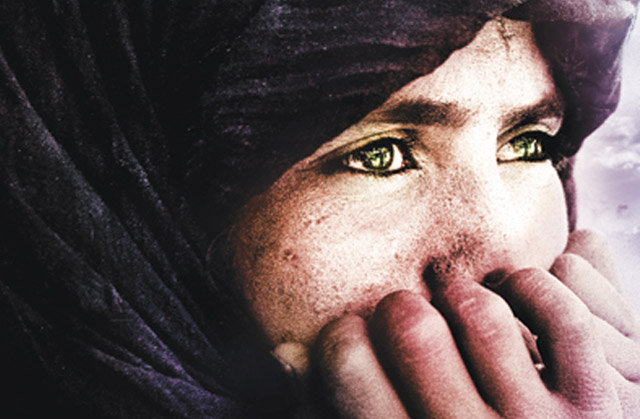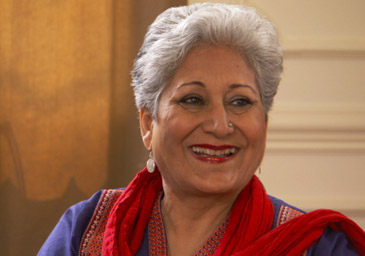CHICAGO – In anticipation of the scariest week of the year, HollywoodChicago.com launches its 2024 Movie Gifts series, which will suggest DVDs and collections for holiday giving.
Interview: Raheel Raza of ‘Honor Diaries’ at the Chicago International Film Festival
CHICAGO – The issue of women’s rights in Muslim majority countries in the Middle East and elsewhere is often overshadowed by the other back-and-forth circumstances in relationship to Western countries. The documentary “Honor Diaries” is an exposure of the misogyny within the Muslim majority countries, and how it permeates into the entire Islamic culture. The film will be presented on October 15th, before the general release in March of 2014.
The “honor” in the title refers to the justification for oppression of women within the Muslim cultural society. The woman holds all the honor of the family, and must capitulate to arranged marriages and overall harsher treatment because they must uphold these traditions. Extreme practice of protecting this “honor” has led to physical and psychological abuse, all the way up to murder, according to the “Honor Diaries.”
 Photo credit: Chicago International Film Festival |
One of the participants in the film is Raheel Raza, the President of the Council for Muslims Facing Tomorrow. She is an author, journalist and outspoken human rights advocate in Canada and North America. During a break in promoting “Honor Diaries,’ Ms. Raza spoke to HollywoodChicago.com.
HollywoodChicago.com: You are a self described strong and faithful follower of Islam. How were the teachings of that religion perverted so far as to create a patriarchy that advocates institutional misogyny?
Raheel Raza: For 1400 hundred years, the Koran and Islam has been interpreted by men. While this is no disrespect to men, it is their agenda. It has been to their benefit to consider that women are there to make the tea, to clean up, to be oppressed and to be third class citizens. This patriarchy has permeated the entire culture. The Muslim majority countries are largely patriarchal. And because of the lack of education and empowerment for women, they has not been a movement to stand up against the status quo. The women themselves become part of the problem because they accept the status quo.
HollywoodChicago.com: What are the psychological roots, in your opinion, of the violence and even murder that erupts in the ‘protection’ of this honor?
Raza: It would be easy for me to say that they are mentally unbalanced, but they’re not. It’s premeditated murder, which is the direction we’ve been trying to convince various authorities of, to make it a criminal offense in North America.
This idea of honor – that it is embedded in the psyche of Muslim women – is a very warped idea versus the general definition of honor. This may have been in place 1400 years ago in the age of the tribes, since their honor was at stake and it was more important, but we’re not talking about those times any more. Unfortunately, many dogmatic Muslims, including the culture in Saudi Arabia – which is the Wahabi ideology – tends to say that the only good Muslim is a ‘7th Century’ Muslim. The irony and the hypocrisy of it is very apparent – there are double standards, one for women and minorities who are victimized over and over, and another that the patriarchy applies to themselves. In their minds, they are doing it as part of the religion, but that religion has never said oppress or kill women.
HollywoodChicago.com: It is said that both the slave and the slave owner are equally punished in the oppression that occurs between them. What type of spiritual crisis do you observed for the women within the patriarchy, that still insists on following these ancient, oppressive laws?
Raza: It’s a crisis of enormous proportions, and unfortunately the world is not aware of it. That is why ‘Honor Diaries’ is such an important film, because it brings awareness to the problem. The ‘slaves’ in your example are the victims of this patriarchy – women in third world countries – and they have no education, enlightenment or economic and social empowerment. My ethical and moral responsibility is to use my freedom to help these women, and speak out for them. I will take the backlash, and the fallback from that, which is a small issue next to the truth of the larger problem.
HollywoodChicago.com: The Western capitulation to oppressive cultures like Saudi Arabia are mostly economic. How can a movement for change overcome economic forces like oil wealth and the propaganda and capitulation that stems from it?
Raza: North America is trying to become more independent of foreign oil and gas, and that’s very important. But there also has to be the awareness that the problem of oppression exists, and that evil is emanating from Saudi Arabia. The concept of the Wahabi ideology of patriarchy is not new, and has been penetrating the Western mosques for the last 30 years. Western governments need to be more aware, and need to speak out against it.
HollywoodChicago.com: In your opinion, what does the world fear about female sexuality that has manifested into a religious interpretation of it? Why does a biological force, that is totally natural, cause such institutionalized fear?
Raza: In the Muslim world, it’s the insecurity of the patriarchy. They are afraid if they give the rights to women that has been present since the very inception of Islam – the pre-nuptial agreements, allowing women to keep their own names, the right of divorce and working side-by-side with men – that somehow everything would collapse. It comes down to that male insecurity, and we need to counteract it by promoting a three prong approach for oppressed women – education, empowerment and enlightenment.
HollywoodChicago.com: Are there men who are unafraid to stand up against the forces of their extremist Muslim brothers, and call the honor out for what it is, an abusive fraud?
Raza: Absolutely, my husband is a prime example – feminist to the core – and there are many wonderful men. If it wasn’t for the men working with us, I wouldn’t have had a role in the film. ‘Honor Diaries’ is not anti-men, it is a movement to educate them. There is a denial that needs to be shaken.
HollywoodChicago.com: One of the reactions of misogyny in Judaism was a reform movement that becomes more relevant as ancient traditions die off. Is the Islam faith doing similar reformations, and is there hope through those reformations that change can happen?
 Raheel Raza in ‘The Honor Diaries’ Photo credit: Chicago International Film Festival |
Raza: Yes, we’re are not there yet, but this is what we need. I always look to Judaism as an example, and Islam itself has taken a lot from Judaism. The reformation movement in Judaism is beautiful, in following the faith in any way that you want. It can even be fundamental, but the key is not to impose it on anybody else. Islam needs to look at that, to learn from that, and the reform is beginning. It needs to come from North America, from women, with the support of men.
HollywoodChicago.com: We are two generations removed in the United States from the major feminist movement that opened up the puritan and economic repression of women in this society. Has that freedom caused the honor society to circle the wagons even more, keeping the idea of a more Western freedom away from their misogynistic traditions?
Raza: The short answer is yes, but there are hypocrisies and double standards here as well. Many times in Muslim majority societies, they look upon feminism as a Western construct. It’s evil and it started there, it’s not Islamic and they’re not going to do it. But they don’t have any qualms about adopting other attitudes that are Western. And also, these countries adore America, and everything that is American.
But at the same time hating the West is also the norm. This comes from Al Qaeda, Khomeini-ism and the Muslim brotherhood that America is the enemy. Why? Because when you have an enemy you don’t look at your own problems. It’s a deflection. If they have a conspiracy theory that everything that’s wrong in the Muslim world is the fault of someone else, they don’t have to take any accountability or responsibility.
HollywoodChicago.com: How are these ‘hate America’ proclamations given weight in the Muslim world?
Raza: By accusations of Islam-ophobia. Any criticism of Islam or Muslims are deflected by the use of this term. I do not accept it, it has been coined to create this deflection.
HollywoodChicago.com: You said in the film, that once you or anybody else in your activism collective kowtows to fear, that the honor system has won. In your opinion, has the United States in general been defeated by fear with their perceptions of the events of 9/11, and the perceptions that it was perpetuated by Muslim factions?
Raza: Not so much fear, but political correctness. This misplaced idea of sensitivity. This also is a form of ‘honor.’ There is a fear that if anyone in the West says something about the culture, then they are racists. I say back – and this is our pet line – that culture is no excuse for abuse. I say human rights trump sensitivity and fear. Our fears are minuscule compared to the enormity of the human rights problem globally. In North America, there is a kowtowing to political correctness – it’s ‘their problem’ and we can’t speak out against it.
HollywoodChicago.com: You have a self described happy marriage. Is the institution of marriage – born of ancient business, religious traditions and mostly women as property – becoming more irrelevant as the sexes get more equality, and women get more economic and political power?
Raza: It will evolve. Women’s rights are human rights. Once women are able to implement their human rights, then equality follows automatically. This is about freedoms, and as women empower themselves they will come to that equal relationship. The Koran says that men and women are spiritually equal, created from one soul. That’s all I need to allow me to understand that men and women have an equal relationship. So yes, my husband washes the dishes, [laughs] but we also have a beautiful relationship.
 | By PATRICK McDONALD |


